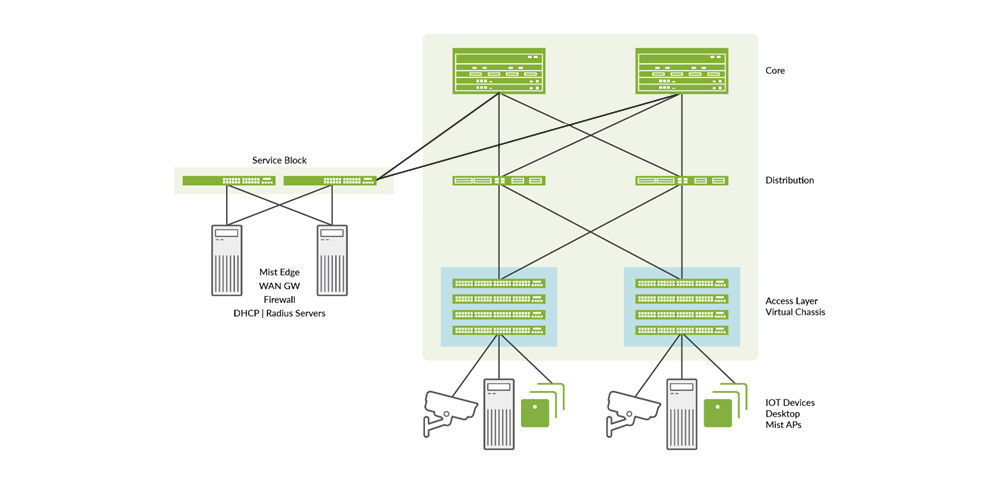Juniper’s Validated Design for Building a Campus Fabric IP Clos Solution Brief
A repeatable design for huge-scale, secure, and flexible campus fabric
Learn how to reduce risk, save time and money, and assure network optimization with JVD.
CAMPUS FABRIC JVD
The number of mobile devices is expected to reach 18.22 billion by 2025
The challenge
The rising demand for IoT and mobile devices is driving massive transitions in the networks that support these endpoints. As the number of devices grows, so does network complexity with an ever-greater need for scalability, segmentation, and security.
THE CAPABILITIES YOU NEED
JVDs are comprehensive, end-to-end blueprints for deploying Juniper solutions in your network
JVD differentiators
Supporting these trends for large enterprises requires a robust campus architecture, like IP Clos. But safe and secure implementations require a strict set of guidelines.
- Repeatability
Prescriptive designs, where all JVD customers benefit from lessons from worldwide deployments.
- Reliability
Integrated, best practice designs tested with real-world traffic and described with measured results.
- Velocity
Streamlined deployment with step-by-step guidance, automation, and prebuilt integrations.
- Consistency
When JVDs are utilized, resultant networks are far more rigorous, stable, and maintainable.
THE ANSWER: JVD
Juniper Validated Designs (JVD)
These modern challenges require networks that are cloud-ready, scalable, and efficient. A Campus Fabric IP Clos is both simple and scalable, ensuring operational efficiencies with optimal personal experiences for end users. Implementing the solution with Mist Wired Assurance ensures flawless operator and user experiences.
HOW IT WORKS
Campus Fabric IP Clos Juniper Validated Design
To handle any amount of endpoint growth, Juniper’s Campus Fabric IP Clos JVD shows how to decouple the underlay (physical) network from the overlay network (virtual topology). This provides a much more flexible, functional, high-performance network in ever-changing IT environments.
The Campus Fabric IP Clos architecture provides consistent, personalized experiences for end users. Operators have an AI- and cloud-native network that easily handles the rising complexity of network endpoints. Enterprises enjoy the flexibility of providing Layer 2 and Layer 3 connectivity for all endpoints across campuses and data centers while maintaining a consistent physical architecture (Figure 1).
The Layer 3 VXLAN gateway resides at the access layer. The flexibility of Layer 3 access is perfect for enterprises who have large “east to west” (between servers in data centers or between clouds) traffic patterns, often including multicast.

FIGURE 1
The Campus Fabric IP Clos JVD solution
CORE CAPABILITIES
JVDs minimize operational costs and reduce the IT burden
Reduced flooding/learning
Control plane-based Layer 2 and Layer 3 learning reduces the “flood and learn” issues in traditional campus-switched networks. The EVPN control plane handles the exchange and learning of MAC addresses through eBGP routing, rather than a Layer 2 forwarding plane. Not having to learn MAC addresses in the forwarding plan has a huge impact on performance as the number of endpoints grows.
With minimal management traffic, nearly all the bandwidth is available for production traffic.
Scalability
Efficient control plane-based address learning at Layers 2 and 3.
For example, in a Campus Fabric IP Clos, core switches only need to learn the access layer switch addresses instead of the device endpoint addresses. Thus, the core scales far into the future with predictable growth as branches, users, and devices are added.
Seamless, consistent end-to-end network
The network uses the same EVPN/VXLAN architecture across disparate campus and data center deployments. A VXLAN overlay provides Layer 2 extension across campuses without any changes to the underlay network.
Flexible traffic isolation with simple security policies
Operators can microsegment groups in their network with the flexibility of Group Based Policies (GBP). The power of microsegmentation enables EVPN-VXLAN to provide traffic isolation within and between broadcast domains as well as simplify security policies across a Campus Fabric.
Location-agnostic connectivity
The EVPN-VXLAN campus architecture provides a consistent endpoint experience no matter where the endpoint is located. Some endpoints require Layer 2 reachability, such as legacy building security systems or IoT devices.
HOW WE DELIVER

The JVD program develops well-characterized, multidimensional solutions that reduce complexity for networking teams

Physical infrastructure supported by a JVD proves solution viability, with results provided in test reports
OUR ADVANTAGE
Implementing JVD with Mist Wired Assurance
AI for IT Operations
In addition to the network itself, managing and operating the network is key to keep it running smoothly and efficiently.
Mist AI delivers unique capabilities for both wired and wireless LAN:
- Wired and wireless assurance: Mist is enabled with wired and wireless assurance. Once configured, Service Level Expectations (SLE) for key wired and wireless performance metrics, such as throughput, capacity, roaming, and uptime, are addressed in the Mist platform.
- The Marvis Virtual Network Assistant: An integrated AI engine that provides rapid wired and wireless troubleshooting, trending analysis, anomaly detection, and proactive problem remediation.
Mist also optimizes the deployment of the network. For more information, see Implementing Branch Networks for AI-Driven Enterprises.
Wired Assurance
Juniper Mist Wired Assurance is a cloud service that brings automated operations and service levels to the Campus Fabric for switches, IoT devices, access points, servers, and printers. Marvis further simplifies troubleshooting while streamlining help desk operations by monitoring events and recommending actions.
Mist UI Workflow
The Mist UI Workflow makes it easy to create campus fabrics, including the Campus Fabric IP Clos.
Mist provides templates to choose the topology and allocate device roles, define networks of interest and the physical connections, and apply the network fabric’s intent.
Supported devices and full details on the workflow are detailed in the Juniper Validated Design for Campus Fabric IP Clos Using Mist Wired Assurance.

WHY JUNIPER
The Juniper difference
This JVD provides a proven robust BGP/EVPN implementation on all QFX Series and EX Series switches using Mist Wired Assurance.
Juniper Networks is uniquely positioned to bring EVPN technology to its full potential by providing optimized, seamless, and standards-compliant L2 or L3 connectivity, both within and across today’s evolving campuses and data centers. Juniper’s campus fabrics, based on a VXLAN overlay with an EVPN control plane, are an efficient and scalable way to build campuses and interconnect multiple campuses, data centers, and public clouds.
The Juniper Network Campus Fabric IP Clos, coupled with Mist AI’s use of AI, machine learning, and data science, optimizes user experiences and simplifies operations across the wireless and wired domains.
Mist Campus Fabric provides a templatized, repeatable method to build IP Clos campus fabrics that enable EVPN-VXLAN overlay networks. The advantages of this are in the areas of scale, operator and user experience, microsegmentation, and an overlay to carry security policies across the fabric.
With the Mist UI workflow detailed in the JVD, this is a straightforward deployment with a simple configuration and proven results.
MORE INFORMATION
Learn more about Campus Fabric IP Clos
To learn more about Campus Fabric IP Clos using Mist Wired Assurance—JVD, visit our website at https://www.juniper.net/documentation/us/en/software/jvd/jvd-campus-fabric-ip-clos-wired-assurance/index.html
For technical data sheets, guides and documentation, visit https://www.juniper.net/documentation/us/en/software/jvd/testreportbrief-campus-fabric-ip-clos-wired-assurance.pdf






















